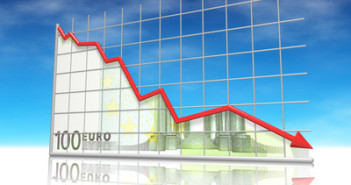Euro dollar slides towards the support line on some profit taking. The first Greek vote initially resulted in a sell off, and the pair gained only later. A second Greek vote as well as other events are due.A big group of weak European figures also weighs on the common currency. Is the pair consolidating before another break higher? Or is a drop around the corner?
Here’s a quick update on technicals, fundamentals and what’s going on in the markets.
EUR/USD Technicals
- Asian session: Active session saw the pair break above 1.4450, in a late reaction to the Greek vote. It began sliding in the European session.
- Current range 1.4450 to 1.4550.

- Further levels in both directions: Below 1.4450, 1.4375, 1.4282, 1.4220, 1.4160, 1.4120, 1.4030, 1.3950,
- Above: Â 1.4550,1.4650, 1.47, 1.4775, 1.4882.
- 1.4450 is a key line separating ranges. A break lower could open the door for quicker falls.
- 1.4550 proved to be strong barrier.
Euro/Dollar sliding after gains  – click on the graph to enlarge.
EUR/USD Fundamentals
- 6:00 German Retail Sales. Exp. +0.6%. Actual -2%.
- 6:45Â French Consumer Spending. Exp. +1%. Actual -1.5%.
- 7:55Â German Unemployment Change. Exp. -17K. Actual -8K.
- 8:00 European M3 Money Supply. Exp. +2.2%. Actual +2.4%.
- 9:00 European CPI Flash Estimate. Exp. 2.8%. Actual 2.7%. This means a hike is coming next week.
- 12:30 USÂ Unemployment Claims. Exp. 420K.
- 13:45 USÂ Chicago PMI. Exp. 54.1 points.
For more events later in the week, see the Euro dollar
EUR/USD Sentiment
- First Greek vote passes. When will the second one be? Yesterday, the Greek vote. As this was expected, the pair initially fell .A second vote, on the implementation laws, is scheduled for tonight, but might be delayed until tomorrow. This is also likely to pass.
- Trichet will raise the rates: The president of the ECB spoke at the European parliament and made it clear that the central bank will raise the rates. The fresh inflation figure was only marginally lower than expected. This won’t stop the hike. The hike will hurt struggling countries, but this doesn’t seem to be of interest to the ECB.
- Private sector contribution: A conference in Rome is discussing details of a private sector participation in the Greek crisis – by rolling over the Greek debt. This comes after the French banks agreed  to Greek restructuring. They are the biggest holders of Greek debt. The big question is: Will CDS will be triggered under this “voluntary†participation?
- No QE3: In the press conference that followed the rate decision, Ben Bernanke played down the option of another quantitative easing program. He compared the same period one year ago, and said that employment is rising faster and there is no threat of deflation now. No new dollar printing is good for the dollar. QE2 officially ends today.



